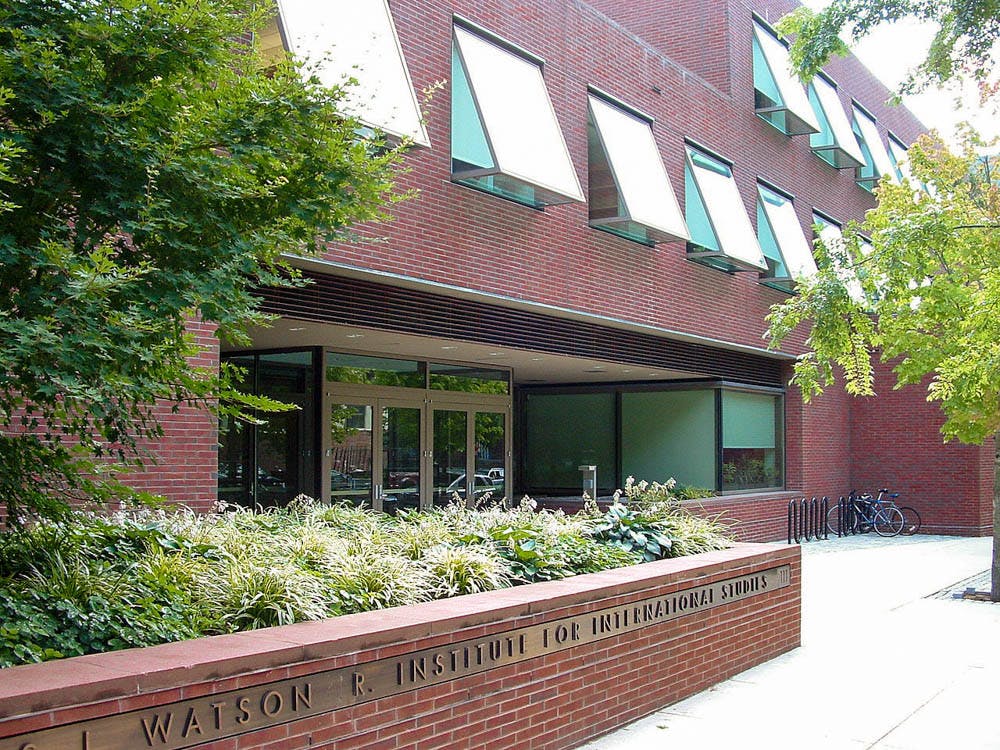Last April, the Office of the Dean of the College led a review of the three undergraduate concentrations affiliated with the Watson Institute for International and Public Affairs. The eventual report produced by the committee recommended changes to the programs’ structures, curricula and advising practices.
Among other changes, the committee recommended that the three Watson concentrations — development studies, international relations and public policy — be combined into a single concentration with two tracks, according to the report. The proposed changes have elicited mixed reactions from faculty and students. In response to the spring report, a committee of Watson faculty is now conducting an internal review of the concentrations with the goal of crafting its own proposal.
The report
Former Dean of the College Maud Mandel chaired the review of the Watson concentrations. Other committee members included faculty from disciplines outside of Watson, administrators and students, according to the report.
The committee’s work was “a genuine effort done in good faith to look with fresh eyes on these three concentrations,” said J. Timmons Roberts, committee member and professor of environmental studies and sociology.
In crafting the report, the committee reviewed information and data about the concentrations, compared the programs with those at similar universities and met with the heads of the disciplines, Roberts said.
At the core of the report, committee members suggested reducing “the number of concentrations from three to a single concentration with two tracks.” One development track “might be loosely modeled on the current (development studies) concentration,” while the other governance track “would reimagine the former public policy and international relations concentrations into a single track focused on comparative policy,” according to the report.
The new model would emphasize the “critical concept of ‘global studies’” rather than “traditional ‘international relations”’ to evaluate and critique “our increasingly interconnected world,” the report states, adding that several peer schools have already adapted this structure.
“This feels like a really good opportunity to re-examine the concentrations, not because the concentrations are in trouble but rather the world is just in a very different place (from) where a lot of us expected it to be,” said Edward Steinfeld, the director of Watson.
But according to Nina Tannenwald, director of the IR program, this proposal “would effectively eliminate the IR concentration by folding it into a public policy concentration,” she wrote in an email to IR concentrators.
“It’s puzzling to me that the largest and most popular of the Watson Institute concentrations would be the one that’s eliminated while the smallest one — development studies — is preserved,” Tannenwald told The Herald.
Within the new concentration structure, there would be several curricular changes including the addition of a required introductory course for concentrators that would be co-taught and “provide students with a broad and interdisciplinary foundation to global studies and development.”
Isabella Saker ’20, a public policy concentrator, thought that the committee’s recommendation to combine IR and public policy would reduce the nuance in academic study provided by three distinct concentrations.“In the end, it really does a disservice to students because we go to a school with such an open curriculum already that if I wanted to diversify my academic background and take some IR classes I could.”
Concentrators would also be required to take “three full years of university study” in a foreign language, though the report stipulates that further discussion of the mandate is needed for students “focusing on the U.S. region.” Currently, IR and development studies concentrations require three years of language study, but there is no language requirement for public policy.
Additionally, the committee suggested the development of a research design course for sophomores and juniors. Tannenwald praised this development.
For advising, the committee reported varying levels of satisfaction with the advising structure of the three concentrations. According to the report, IR concentrators described a “notable lack of sufficient faculty to provide hands-on advising and thesis support,” while development studies concentrators communicated “a high level of satisfaction” with their advisors. The spring report recommended pairing undergraduate concentrators with a faculty advisor and limiting each faculty member to six advisees per advising cohort to remedy student concerns.
“Students were having trouble even being able to meet with and find academic advisors to figure out what courses (to take)” Roberts said.
Annie Phan ’20, a Development Studies DUG leader, echoed Roberts’ call for an improved advising structure, adding that students will benefit “if Watson tries to put more emphasis on smaller (advising groups).”
Further review from Watson faculty committee
Watson has formed its own faculty committee to review its undergraduate concentrations in response to the report from the Office of the Dean of the College.
“I thought it was an excellent report … (but) our charge is not simply to implement what the report says,” said Steinfeld, a member of the faculty committee. “We are agnostic about the particular path that was recommended — or at least mentioned — in the Dean of the College’s report, but we’re taking it up and examining it.”
The faculty committee held town halls Oct. 16 and 23 to gather feedback from concentrators. “It’s great that students are being invited to participate,” Tannenwald said.
“The Watson Institute concentrations could use a little bit of revamping,” said Jason Togut ’20, an IR department undergraduate group leader. “I was excited to hear about the changes. The Global Studies idea is a lot better.”
“We are open to a bunch of possibilities, but the path of reform delineated in the report is not the only option,” Steinfeld said. “We’re very early in the process. … We’re basically in data-gathering mode now and then also brainstorming mode.”
Steinfeld said that the committee hopes to have drafted a proposal addressing potential changes to the Watson undergraduate concentrations by the end of this semester. Once this proposal is complete, the committee will gather additional feedback from students and Watson faculty, Steinfeld said.





